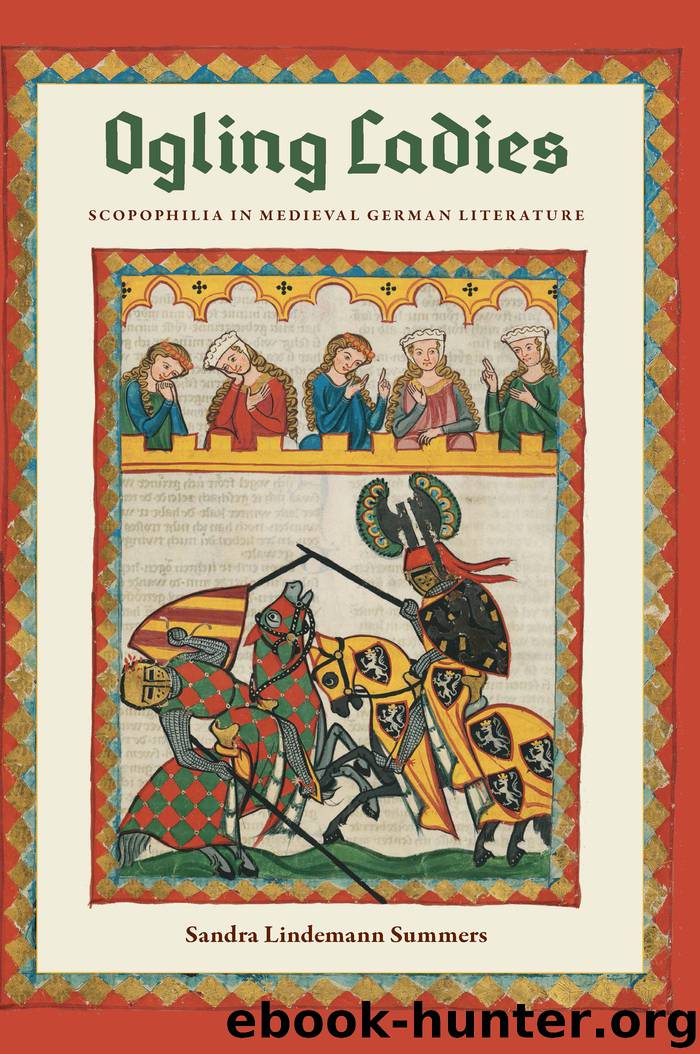Ogling Ladies by Summers Sandra Lindemann;

Author:Summers, Sandra Lindemann;
Language: eng
Format: epub
Publisher: University Press of Florida
Published: 2019-03-01T16:00:00+00:00
7
Knight or Eye Candy?
THE GENDERING GAZE IN HARTMANN VON AUE’S IWEIN
The queen awakes from her nap and walks in on an informal gathering of knights who are listening to Kalogrenant recount an adventure. Even though there is nothing to see, the storyteller “projects” and reenacts the event, turning his audience into spectators. The sleepy queen suddenly finds herself in the traditional role of a noble lady watching knightly pursuit. This time, though, she was not an invited guest; she had inadvertently and inconveniently infiltrated an all-male gathering. Not surprisingly, Kalogrenant hesitates to continue his tale about a confrontation that ended in abject defeat and humiliation. Courtly ladies were supposed to witness only successful quests. Kalogrenant, the failed hero, is fully aware that he left a stain on the glossy image of Arthurian knighthood; another knight must now blot it out.
In this case, it is the young knight Iwein who takes up the challenge and deliberately, without waiting for the king’s official blessing, sets out to repair the cracked Round Table. The queen will not see young Iwein’s actual quest to restore the good name of his brother-in-arms, but she will surely hear about it later. Also, many other noble ladies witness his adventures. In addition to the ogling female characters, the narrator’s extra-diegetic gaze on Iwein stands in for the female gaze. Thus, reading and listening women can “observe” the adventure, albeit with narrative delay.
In the following pages I will look closely at the diegetic gaze of female characters populating Hartmann von Aue’s poem Iwein. The outside gaze, meaning contemporary readership of romances, was also primarily female. The countless dedications to their doyenneship at the beginning of manuscripts point to the conclusion that ladies played an active role in the writing of Arthurian romance, even though, with the exception of Marie de France, they did not themselves author any of the poems. Iwein, in particular, exemplifies how male medieval poets focused on female audiences, composing specifically for this readership, customizing the narrative to the ladies’ approving gaze.
The main female personage in Iwein is Lunete, a maiden in the service of Lady Laudine. Lunete secretly watches Iwein during his fight with the lord of the realm which Iwein unlawfully entered. She recognizes him as the only knight who courteously greeted her during a visit to Arthur’s court. She reminds him of this fact:
herre, do gruozetet ir mich,
und ouch dâ nieman mêre.
do erbutet ir mir die êre
der ich iu hie lônen sol.
herre, ich erkenn iuch wol (ll. 1194–98)
(Sir, you and you alone greeted me back then. You honored me in that way then for which I will repay you now. Yes, lord, I recognize you well.)
One might read this passage as a critique of male courtly behavior. Only a single knight actually lived up to the ideals of chivalry? All the others rudely ignored both the girl and the rules of conduct? It turns out that Iwein acted not only courteously but shrewdly when he greeted Lunete at Arthur’s court; his small gesture paid off handsomely when she supplies him with some rather useful magical objects.
Download
This site does not store any files on its server. We only index and link to content provided by other sites. Please contact the content providers to delete copyright contents if any and email us, we'll remove relevant links or contents immediately.
4 3 2 1: A Novel by Paul Auster(11788)
The handmaid's tale by Margaret Atwood(7446)
Giovanni's Room by James Baldwin(6807)
Asking the Right Questions: A Guide to Critical Thinking by M. Neil Browne & Stuart M. Keeley(5355)
Big Magic: Creative Living Beyond Fear by Elizabeth Gilbert(5350)
Ego Is the Enemy by Ryan Holiday(4954)
On Writing A Memoir of the Craft by Stephen King(4660)
The Body: A Guide for Occupants by Bill Bryson(4580)
Ken Follett - World without end by Ken Follett(4441)
Bluets by Maggie Nelson(4259)
Adulting by Kelly Williams Brown(4231)
Eat That Frog! by Brian Tracy(4147)
Guilty Pleasures by Laurell K Hamilton(4115)
White Noise - A Novel by Don DeLillo(3828)
The Poetry of Pablo Neruda by Pablo Neruda(3813)
Fingerprints of the Gods by Graham Hancock(3731)
Alive: The Story of the Andes Survivors by Piers Paul Read(3728)
The Book of Joy by Dalai Lama(3694)
The Bookshop by Penelope Fitzgerald(3615)
